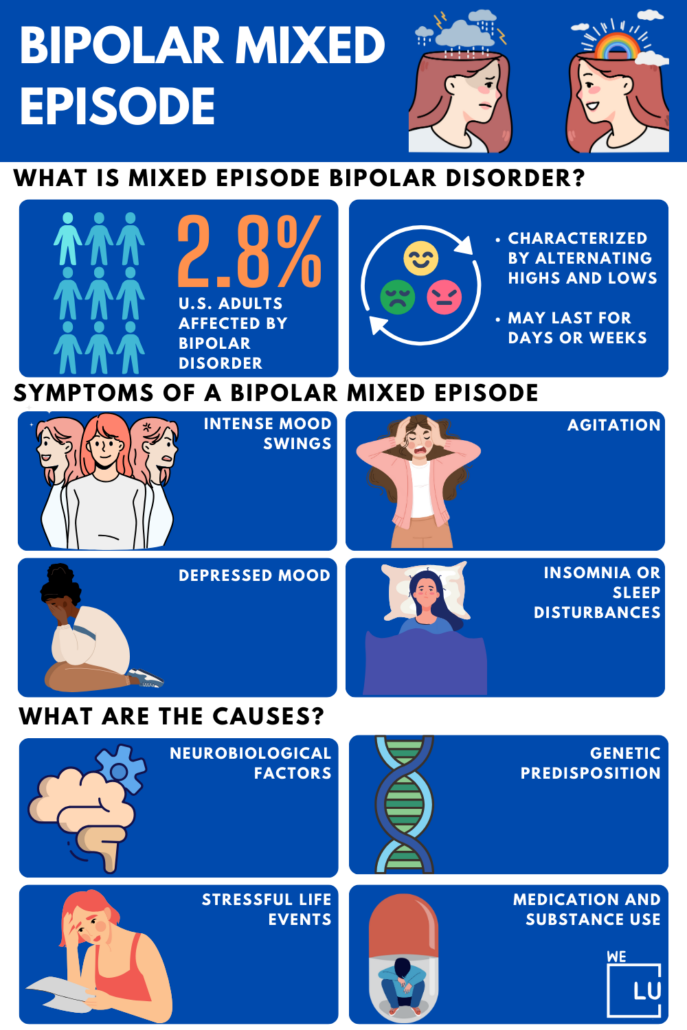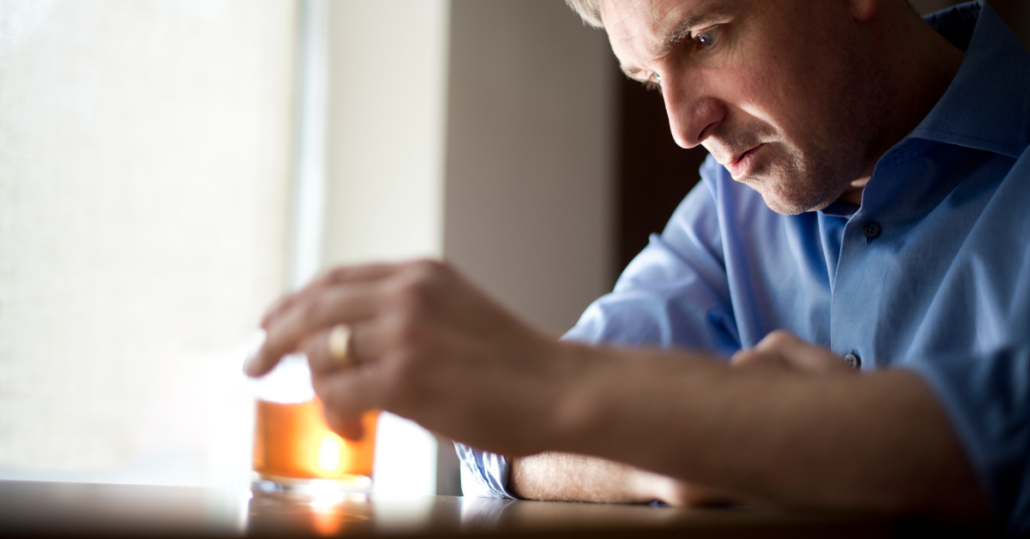What Is a Mixed Episode Bipolar Disorder?
Bipolar disorder is a complex mental health issue that affects about 2.8% of adults in the U.S. It makes people go through ups and downs that can last for days or weeks. We’ll look into its symptoms, causes, diagnosis, and ways to treat it, including a tricky part called bipolar mixed episodes.
Bipolar Mixed Episode Overview
Bipolar Mixed Episodes differ from the usual highs and lows in bipolar disorder. They bring mixed emotions, like:
- Feeling happy and sad simultaneously
- Restless and tired
- Hopeful and hopeless
We’ll talk about the symptoms of these episodes, which include:
- Rapid mood swings
- Agitation
- Trouble focusing
- Sleep problems
- Self-harm
It’s important to spot these signs and get help, especially if thoughts of self-harm come up.
Researchers and experts are still figuring out what causes these mixed episodes. They think things like genetics, imbalances in the brain, and life stress could be part of it.
We’ll also explore the treatments available for people with Mixed Bipolar Disorder, which can be a bit complex. It often involves a mix of medications and therapy to help manage these episodes.
Who Gets Bipolar With Mixed Features?
Bipolar disorder can affect almost anyone, with about 2.5% of the U.S. population, which is nearly 6 million people, experiencing it in some form. Mixed episodes are common in bipolar disorder, happening when people with this condition show both high and low mood symptoms together, with half or more experiencing manic symptoms during a full depressive episode.
Those who develop bipolar disorder in their teenage years may be more likely to have mixed episodes. Some people with severe depression but not full-blown mania might show mild manic symptoms. This isn’t always enough for a bipolar disorder diagnosis and is sometimes called “mixed depression.”
What Are The Bipolar Mixed Episode Symptoms?
Symptoms of a bipolar mixed episode can be particularly distressing and challenging to manage. This specific state involves the simultaneous presence of features from both the manic and depressive phases of bipolar disorder.
A mixed episode can be dangerous as the combination of depressive thoughts and increased energy from mania can lead to impulsive and harmful actions. If you or someone you know is experiencing symptoms of a bipolar mixed episode or having thoughts of self-harm or suicide, seek immediate professional help or contact a mental health helpline.
The symptoms may vary from person to person, but common signs of a bipolar mixed episode include:
- Intense Mood Swings: Rapid and unpredictable shifts between elevated and depressed moods, often experienced within a short period.
- Agitation: Restlessness, irritability, and a feeling of being on edge.
- Depressed Mood: Persistent feelings of sadness, hopelessness, or emptiness.
- Increased Energy: Heightened energy levels can lead to impulsive and reckless behaviors.
- Insomnia or Sleep Disturbances: Difficulty falling asleep or staying asleep, coupled with a sense of restlessness.
- Racing Thoughts: A flood of racing thoughts and an inability to concentrate on one task.
- Poor Judgment: Engaging in risky behaviors without considering the consequences.
- Psychomotor Agitation or Retardation: Physical restlessness or slowed movements.
- Loss of Interest: Diminished interest in previously enjoyable activities or hobbies.
- Fatigue: Feeling physically and mentally exhausted despite increased energy levels.
- Feelings of Guilt or Worthlessness: Negative self-perception and unwarranted guilt.
- Suicidal Thoughts: In severe cases, individuals may experience thoughts of self-harm or suicide.
Take the free online Bipolar test. Get a head start on your condition today.

Skip To:
Learn More:
- Is Bipolar a Personality Disorder? BPD vs. Bipolar
- 4 Common Bipolar Symptoms in Men, Signs, Tips, & Treatment
- Bipolar Disorder Medication, 8 Side Effects, and Effective Treatment
- Bipolar Schizophrenia, What’s the Difference? Bipolar vs. Schizophrenia Symptoms and Signs.
- Understanding How a Bipolar Person Thinks. What Does Bipolar Feel Like? Signs and Symptoms of Bipolar Disorder
- Understanding Bipolar Psychosis. Bipolar with Psychosis Symptoms, Cause, and Treatment.
- Bipolar Disorder Therapies. Different Types of Effective Therapy for Bipolar Disorder
- ADHD and Bipolar Symptoms and Signs. Differences Between ADHD vs Bipolar in Adults vs Children, Diagnosis & Treatment.
- Understanding Rapid Cycling Bipolar Disorder. Symptoms, and Effective Treatments.
- Bipolar Symptoms In Women. Signs, Symptoms and Tips
The We Level Up Mental Health Centers can help empower families affected by Bipolar and their loved ones with valuable insights into effective coping strategies and recovery therapy. Call today for a free Bipolar assessment.

End the Emotional Pain. Get Your Life Back.
Feeling Depressed, Anxious or Struggling with Mental Health Illness? Get Safe Comfortable Mental Health Dual Diagnosis High-Quality Therapy From Counselors That Care. Begin Your Recovery Now.
Hotline (855) 940-6125We Level Up Bipolar Mixed Episodes Mental Health Center Tips and Strategies
Bipolar disorder episodes can be triggered by stress, especially for those with a close relative who has mixed episodes of bipolar disorder. Adopting a healthy lifestyle can complement medical treatment. Regular exercise, sufficient sleep, a balanced diet, and stress reduction techniques can improve mood stability.
Bipolar Disorder Facts Sheet
Bipolar Disorder:
- Mood Episodes: Characterized by distinct episodes of mania/hypomania and depression.
- Duration: Mood episodes can last for days, weeks, or months.
- Triggers: Episodes can occur without external triggers, and mood shifts are often unrelated to specific events.
- Self-Image: Individuals typically have a stable sense of self and identity.
- Impulsivity: Impulsive behaviors may occur during manic episodes.
- Treatment: Mood-stabilizing medications are often prescribed, along with psychotherapy.
Types of bipolar disorder:
There are several types of bipolar disorder, including:
- Bipolar I disorder: Characterized by manic episodes lasting at least seven days or severe manic symptoms requiring immediate hospitalization.
- Bipolar II disorder: Involves a pattern of depressive episodes and hypomanic episodes, but not full-blown mania.
- Cyclothymic disorder: This is marked by numerous periods of hypomanic and depressive symptoms that last for at least two years (one year for children and adolescents).
Symptoms:
The symptoms of bipolar disorder vary depending on the mood episode:
- Manic episodes: Elevated mood, increased energy, racing thoughts, impulsivity, decreased need for sleep, excessive talking, grandiosity, and risky behavior.
- Hypomanic episodes: Similar to manic episodes but with less severity and a shorter duration.
- Depressive episodes: Persistent sadness, loss of interest or pleasure in activities, changes in appetite and sleep patterns, fatigue, feelings of guilt or worthlessness, difficulty concentrating, and thoughts of death or suicide.
Impact on daily life:
- Bipolar disorder can significantly impact various aspects of a person’s life, including relationships, work or school performance, and overall quality of life. However, with proper treatment and support, individuals with bipolar disorder can manage their symptoms effectively and lead fulfilling lives.
Learn more with the Bipolar Disorder PDF download below
Bipolar Disorder Statistics
Studies show that approximately 60-70% of individuals with bipolar disorder have at least one comorbid psychiatric disorder, such as anxiety disorders, substance use disorders, or attention-deficit/hyperactivity disorder (ADHD).
2.4%
The global prevalence of bipolar disorder
Source: CDC
25 years
Bipolar disorder typically emerges in late adolescence or early adulthood
Source: NIMH
3:1
BPD is more commonly diagnosed in females
Source: NIH
What Are The Causes of Mixed Episode Bipolar?
Mixed episodes in bipolar disorder, also called “mixed states,” are not entirely understood, but research is ongoing. Some factors that might contribute to these challenging phases include:
- Neurobiological Factors: Imbalances in brain chemicals like serotonin, dopamine, and norepinephrine are linked to mood regulation. When these imbalances happen simultaneously, they can lead to mixed episodes with conflicting moods.
- Genetic Predisposition: Bipolar disorder often runs in families, suggesting a genetic role. If your family has a history of bipolar disorder, you might have a higher risk of mixed episodes. But genes alone don’t determine it; other factors are involved.
- Stressful Life Events: Stress, like big life changes or trauma, can trigger mixed episodes by disrupting mood regulation and coping.
- Medication and Substance Use: Certain drugs, like antidepressants or stimulants, can cause mixed episodes in some people with bipolar disorder. Substance abuse, especially stimulants or hallucinogens, can also induce varied symptoms.
- Comorbid Conditions: Other mental health issues, like anxiety or personality disorders, can make you more prone to mixed episodes. These conditions, combined with bipolar disorder, can make mood control more complicated.

Suffering from bipolar mixed episodes? Uncover inpatient mental health rehab that works. Discover professional help from We Level Up’s inpatient mental health therapists. Start getting support with a free call to our Bipolar disorder hotline.
Get Help. Get Better. Get Your Life Back.
Searching for Accredited Dual Diagnosis Mental Health Centers Near You?
Even if therapy failed previously, or are in the middle of a difficult crisis, we stand ready to support you. Our trusted behavioral health specialists will not give up on you. When you feel ready or just want someone to speak to about counseling alternatives to change your life call us. Even if we cannot assist you, we will lead you to wherever you can get support. There is no obligation. Call our hotline today.
FREE 24/7 Dual Diagnosis Mental Health Services HotlineWhat are bipolar mixed features and related symptoms?
Bipolar mixed features encompass a combination of these symptoms, which can make diagnosis and treatment more complex, requiring specialized care to address both the depressive and manic/hypomanic aspects. If you or someone you know is experiencing these symptoms, seeking professional help is vital for proper diagnosis and management.
Here’s a table that outlines the key features of bipolar mixed episodes:
| Symptom Category | Depressive Symptoms | Manic/Hypomanic Symptoms |
|---|---|---|
| Mood | Sadness, hopelessness | Elevated or irritable mood |
| Energy | Low energy, fatigue | High energy, restlessness |
| Sleep Patterns | Changes in sleep (insomnia or hypersomnia) | Reduced need for sleep |
| Appetite | Changes in appetite and weight | Decreased appetite |
| Cognitive Function | Difficulty concentrating, slowed thinking | Racing thoughts, rapid speech |
| Activity Level | Reduced activity and interest | Increased activity and goal-directed behavior |
| Social Behavior | Social withdrawal | Increased social engagement |
| Risky Behaviors | Avoidance of risky behaviors | Engagement in impulsive and risky activities |
First-class Facilities & Amenities
World-class High-Quality Mental Health Services & Behavioral Health Substance Abuse Treatment
Rehab Centers TourRenowned Mental Health Centers. Serene Private Facilities. Inpatient Rehab Programs Vary.
Mental Health Helpline (855) 940-6125Proven recovery success experience, backed by a Team w/ History of:
15+
Years of Unified Experience
100s
5-Star Reviews Across Our Centers
10K
Recovery Successes
- Comprehensive Dual-Diagnosis Treatment
- Complimentary Family & Alumni Programs
- Coaching, Recovery & Development Events
- Comfortable Onsite Medical Detox Center
What is a Bipolar 1 Mixed Episode?

Bipolar 1 mixed episode is a specific phase within the context of Bipolar 1 Disorder, a subtype of bipolar disorder. Bipolar 1 Disorder is characterized by manic episodes that may be followed by depressive episodes or periods of relative stability. During a mixed episode of Bipolar 1 Disorder, individuals experience symptoms of both mania and depression simultaneously. This combination can create a highly intense and challenging emotional state.
During a Bipolar 1 mixed episode, individuals may exhibit the following symptoms:
- Manic Symptoms: Energetic, euphoric, or irritable mood, along with increased energy levels. They may engage in impulsive and high-risk behaviors. Grandiose or inflated self-esteem and racing thoughts are common during this phase.
- Depressive Symptoms: Persistent feelings of sadness, hopelessness, or worthlessness. Changes in appetite, weight, or sleep patterns may occur. Fatigue and loss of interest in previously enjoyable activities are also prevalent.
- Rapid Mood Swings: Individuals may experience quick and intense shifts between manic and depressive states, leading to emotional volatility.
- Agitation and Restlessness: Feelings of restlessness and agitation can exacerbate mood fluctuations.
- Impulsive and Reckless Behavior: Combining manic and depressive symptoms may lead to sudden and high-risk decisions.
What is a Bipolar 2 Mixed Episode?
Bipolar 2 mixed episode is a specific phase within the context of Bipolar 2 Disorder, a subtype of bipolar disorder. Recurrent depressive episodes and hypomanic episodes characterize bipolar 2 Disorder but not full-blown manic episodes seen in Bipolar 1 Disorder. However, during a mixed episode of Bipolar 2 Disorder, individuals experience symptoms of both depression and hypomania simultaneously. This combination can be pretty distressing and challenging to manage.
During a Bipolar 2 mixed episode, individuals may exhibit the following symptoms:

- Depressive Symptoms: Persistent feelings of sadness, hopelessness, or emptiness. They may experience changes in appetite, weight, or sleep patterns. Fatigue and loss of interest in activities once enjoyed are also common.
- Hypomanic Symptoms: Elevated mood and increased energy levels are present, along with feelings of euphoria or agitation. They may engage in goal-directed activities with heightened enthusiasm. However, these symptoms are less severe than full-blown mania.
- Rapid Mood Swings: Individuals may experience rapid and unpredictable shifts between the depressive and hypomanic states, leading to emotional turbulence.
- Agitation and Irritability: Restlessness and irritability are common during a mixed episode, exacerbating mood fluctuations.
- Impulsive Behavior: Combining depressive and hypomanic symptoms may lead to rash decisions and risky behaviors.
- Poor Concentration: Racing thoughts and difficulty focusing can impair cognitive functioning.
- Insomnia or Sleep Disturbances: Changes in sleep patterns, such as difficulty falling asleep or sleeping too much, are frequent during mixed episodes.
- Feelings of Guilt or Worthlessness: Negative self-perception and self-critical thoughts may arise.
World-class, Accredited, 5-Star Reviewed, Effective Mental Health Dual Diagnosis Programs. Complete Integrated Inpatient Rehab with Free Post Discharge Therapy Planning.
CALL (855) 940-6125End the Emotional Pain Rollercoaster. Gain Stability & Happiness Through Recovery Treatment. Start Mental Health Counseling Today. Get Free No-obligation Guidance by Behaviroal Health Specialists Who Understand Mental Health Recovery.
What is The Mixed Bipolar Disorder Treatment?
The treatment for mixed bipolar disorder is a multifaceted approach that aims to stabilize mood, alleviate symptoms, and improve overall functioning. Because mixed episodes involve manic and depressive features, addressing these contrasting symptoms requires a comprehensive treatment plan. Here are some critical components of bipolar mixed episode treatment:
- Mood Stabilizing Medications: Mood stabilizers are the cornerstone of treatment for bipolar disorder, including mixed episodes. Medications like lithium, valproic acid, or certain antipsychotics (such as quetiapine or olanzapine) are often prescribed to help regulate mood swings and reduce the severity of manic and depressive symptoms.
- Antidepressant Adjustment: In some cases, individuals with bipolar disorder may be on antidepressant medications. However, during a mixed episode, antidepressants alone can potentially worsen manic symptoms. Therefore, adjustments to antidepressant medicines or cautious use may be necessary during diverse states.
- Anti-Anxiety Medications: If anxiety symptoms are prominent during the mixed episode, short-term use of anti-anxiety medications (e.g., benzodiazepines) may be considered to provide immediate relief. However, these medications are typically used for short periods due to the risk of dependence.
- Psychotherapy: Psychotherapy, particularly Cognitive-Behavioral Therapy (CBT), can be beneficial in managing bipolar mixed episodes. CBT helps individuals identify and modify negative thought patterns, develop coping strategies, and enhance emotional regulation.
- Family Therapy and Support: Involving family members and loved ones in therapy can improve communication, educate them about bipolar disorder, and create a supportive environment for the individual.
- Hospitalization (In Severe Cases): In some instances, severe mixed episodes may require hospitalization, especially if there is a risk of harm to oneself or others. Hospitalization provides a safe and controlled environment for stabilization and intensive treatment.
- Lifestyle Changes: Adopting a healthy lifestyle can complement medical treatment. Regular exercise, sufficient sleep, a balanced diet, and stress reduction techniques can improve mood stability.
- Substance Abuse Treatment: If substance abuse contributes to the mixed episode, addressing it through counseling and support groups is essential.
- Safety Planning: Developing a safety plan in collaboration with a mental health professional can help the individual and their support network identify warning signs and steps to take during times of crisis.
- Long-Term Management: Bipolar disorder is a chronic condition, and ongoing management is crucial. Regular follow-ups with mental health professionals, medication adherence, and open communication are vital for sustained stability.
Individual responses to treatment can vary, and finding the most effective approach may require trial and error. Therefore, individuals with bipolar disorder need to work closely with a qualified mental health provider to tailor a treatment plan that suits their needs and helps them achieve stability during mixed episodes and beyond.
Let’s work together to reduce the devastating toll this disorder can take on individuals and their loved ones. Continue reading for more and contact We Level Up Biploar specialists to get answers for your situation.
Experience Transformative Recovery at the We Level Up Treatment Center.
See our authentic success stories. Get inspired. Get the help you deserve.



Start a New Life
Begin with a free call to a behavioral health treatment advisor. Learn more about our dual-diagnosis programs. The We Level Up treatment center network delivers recovery programs that vary by each treatment facility. Call to learn more.
- Personalized Care
- Caring Accountable Staff
- World-class Amenities
- Licensed & Accredited
- Renowned w/ 5-Star Reviews
We’ll Call You
Popular Bipolar Mixed Episode FAQs
-
What does a bipolar mixed episode feel like?
A bipolar mixed episode feels like an emotional tornado, with simultaneous highs of mania and lows of depression, causing intense mood swings and emotional turmoil.
-
How common are mixed episodes in bipolar disorder?
Bipolar Mixed episodes are relatively common, occurring in approximately 40% of individuals diagnosed with the condition. They can be particularly severe and significantly impact a person’s well-being and functioning.
Watch the We Level Up FL Mental Health Treatment Center Informative Video
Video Script
The We Level Up FL mental health center represents a state-of-the-art and highly specialized facility dedicated to its clients’ well-being and mental health. It stands as a beacon of modernity, offering innovative behavioral recovery therapy programs at the forefront of the field. Situated in a serene and well-maintained environment, the center boasts meticulously manicured surroundings and outdoor relaxation areas designed to serve as spaces for renewal and tranquility.
Find effective inpatient mental health rehab for bipolar mixed episodes. Get professional help from We Level Up’s skilled therapists. Start receiving support with a free call to our Bipolar disorder hotline.
One of the center’s defining characteristics is its commitment to providing science-based mental health treatments. These treatments are not one-size-fits-all but are meticulously tailored to suit each client’s needs. This individualized approach sets We Level Up FL apart in mental health care.
Search For We Level Up FL Mental Health Bipolar Mixed Episode Topics & Resources
Sources
- National Institute of Mental Health (NIMH) – Bipolar Disorder: https://www.nimh.nih.gov/health/topics/bipolar-disorder/ Learn More: Bipolar Mixed Episode
- NIMH – Borderline Personality Disorder: https://www.nimh.nih.gov/health/topics/borderline-personality-disorder/ Learn More: Bipolar Mixed Episode
- Substance Abuse and Mental Health Services Administration (SAMHSA) – Bipolar Disorder: https://www.samhsa.gov/find-help/disorders/bipolar-disorder Learn More: Bipolar Mixed Episode.
- SAMHSA – Borderline Personality Disorder: https://www.samhsa.gov/find-help/disorders/borderline-personality-disorder Learn More: Bipolar Mixed Episode
- National Alliance on Mental Illness (NAMI) – Bipolar Disorder: https://www.nami.org/About-Mental-Illness/Mental-Health-Conditions/Bipolar-Disorder Learn More: Bipolar Mixed Episode.
- NAMI – Borderline Personality Disorder: https://www.nami.org/About-Mental-Illness/Mental-Health-Conditions/Borderline-Personality-Disorder Learn More: Bipolar Mixed Episode
- Centers for Disease Control and Prevention (CDC) – Mental Health – Bipolar Disorder: https://www.cdc.gov/mentalhealth/basics/bipolar.html Learn More: Bipolar Mixed Episode.
- CDC – Mental Health – Borderline Personality Disorder: https://www.cdc.gov/mentalhealth/basics/borderline.html Learn More: Bipolar Mixed Episode
- Office on Women’s Health (OWH) – Bipolar Disorder: https://www.womenshealth.gov/mental-health/mental-health-conditions/bipolar-disorder Learn More: Bipolar Mixed Episode
- National Institute of Mental Health: https://www.nimh.nih.gov/health/topics/bipolar-disorder/index.shtml